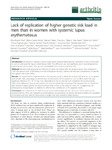Mostrar el registro sencillo del ítem
Lack of replication of higher genetic risk load in men than in women with systemic lupus erythematosus
| dc.contributor.author | Alonso-Pérez, Elisa | |
| dc.contributor.author | Suárez-Gestal, Marian | |
| dc.contributor.author | Calaza, Manuel | |
| dc.contributor.author | Blanco García, Francisco J | |
| dc.contributor.author | Suárez, Ana | |
| dc.contributor.author | Santos, María José | |
| dc.contributor.author | Papasteriades, Chryssa | |
| dc.contributor.author | Carreira, Patricia | |
| dc.contributor.author | Pullmann, Rudolf | |
| dc.contributor.author | Ordi-Ros, Josep | |
| dc.contributor.author | Marchini, Maurizio | |
| dc.contributor.author | Skopouli, Fotini N. | |
| dc.contributor.author | Bijl, Marc | |
| dc.contributor.author | Barrizone, Nadia | |
| dc.contributor.author | Sebastiani, Gian Domenico | |
| dc.contributor.author | Migliaresi, Sergio | |
| dc.contributor.author | Witte, Torsten | |
| dc.contributor.author | Lauwerys, Bernard R. | |
| dc.contributor.author | Kovacs, Attila | |
| dc.contributor.author | Ruzickova, Sarka | |
| dc.contributor.author | Gómez-Reino, Juan J. | |
| dc.contributor.author | González, Antonio | |
| dc.date.accessioned | 2020-04-07T10:51:19Z | |
| dc.date.available | 2020-04-07T10:51:19Z | |
| dc.date.issued | 2014-06-19 | |
| dc.identifier.citation | Alonso-Pérez E, Suárez.Gestal M, Calaza M, Blanco FJ, Suárez A, Santos MJ, et al. Lack of replication of higher genetic risk load in men than in women with systemic lupus erythematosus. Arthritis Res Ther. 2014;16(3): R128 | es_ES |
| dc.identifier.issn | 1478-6354 | |
| dc.identifier.uri | http://hdl.handle.net/2183/25312 | |
| dc.description.abstract | [Abstract] INTRODUCTION: We aimed to replicate a recent study which showed higher genetic risk load at 15 loci in men than in women with systemic lupus erythematosus (SLE). This difference was very significant, and it was interpreted as indicating that men require more genetic susceptibility than women to develop SLE. METHODS: Nineteen SLE-associated loci (thirteen of which are shared with the previous study) were analyzed in 1,457 SLE patients and 1,728 healthy controls of European ancestry. Genetic risk load was calculated as sex-specific sum genetic risk scores (GRS(s)). RESULTS: Our results did not replicate those of the previous study at either the level of individual loci or the global level of GRS(s). GRS(s) were larger in women than in men (4.20 ± 1.07 in women vs. 3.27 ± 0.98 in men). This very significant difference (P < 10(-16)) was more dependent on the six new loci not included in the previous study (59% of the difference) than on the thirteen loci that are shared (the remaining 41%). However, the 13 shared loci also showed a higher genetic risk load in women than in men in our study (P = 6.6 × 10(-7)), suggesting that heterogeneity of participants, in addition to different loci, contributed to the opposite results. CONCLUSION: Our results show the lack of a clear trend toward higher genetic risk in one of the sexes for the analyzed SLE loci. They also highlight several limitations of assessments of genetic risk load, including the possibility of ascertainment bias with loci discovered in studies that have included mainly women. | es_ES |
| dc.description.sponsorship | Instituto de Salud Carlos III; 08/0744 | es_ES |
| dc.description.sponsorship | Instituto de Salud Carlos III; 11/01048 | es_ES |
| dc.description.sponsorship | Instituto de Salud Carlos III; RD08/0075 | es_ES |
| dc.description.sponsorship | Instituto de Salud Carlos III; RD12/0009/0008 | es_ES |
| dc.language.iso | eng | es_ES |
| dc.publisher | BioMed Central | es_ES |
| dc.relation.uri | https://doi.org/10.1186/ar4585 | es_ES |
| dc.rights | Atribución 3.0 España | es_ES |
| dc.rights.uri | http://creativecommons.org/licenses/by/3.0/es/ | * |
| dc.subject | Alleles | es_ES |
| dc.subject | Case-control studies | es_ES |
| dc.subject | Gene frequency | es_ES |
| dc.subject | Genetic predisposition to disease | es_ES |
| dc.subject | Lupus erythematosus | es_ES |
| dc.subject | Polymorphism | es_ES |
| dc.subject | Risk assessment | es_ES |
| dc.subject | Single nucleotide | |
| dc.title | Lack of replication of higher genetic risk load in men than in women with systemic lupus erythematosus | es_ES |
| dc.type | info:eu-repo/semantics/article | es_ES |
| dc.rights.access | info:eu-repo/semantics/openAccess | es_ES |
| UDC.journalTitle | Arthritis Research & Therapy | es_ES |
| UDC.volume | 16 | es_ES |
| UDC.issue | 3 | es_ES |
| UDC.startPage | R128 | es_ES |
Ficheros en el ítem
Este ítem aparece en la(s) siguiente(s) colección(ones)
-
INIBIC- REUMA - Artigos [184]







